Saturday, May 24, 2008
Our Blessed Lady's Saturday: May Edition
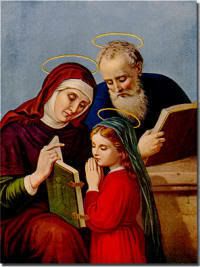
From The Glories Of Mary, By Saint Alphonsus Liguori:
O beloved Mother of God, most amiable child Mary, O that, as thou didst present thyself in the temple, and with promptitude and without reserve, didst consecrate thyself to the glory and love of God, I could offer thee, this day, the first years of my life, to devote myself without reserve to thy service, my holy and most sweet Lady!
But it is now too late to do this; for, unfortunate creature that I am, I have lost so many years in the service of the world and my own caprices, and have lived in almost entire forgetfulness of thee and of God: Woe to that time in which I did not love thee! ("Vae tempori illi, in quo non amavi te!") But it is better to begin late than not at all.
Behold, O Mary, I this day present myself to thee, and I offer myself without reserve to thy service for the long or short time that I still have to live in this world; and in union with thee I renounce all creatures, and devote myself entirely to the love of my Creator. I consecrate my mind to thee, O Queen, that it may always think of the love that thou deservest, my tongue to praise thee, my heart to love thee. Do thou accept, O most holy Virgin, the offering which this miserable sinner now makes thee; accept it, I beseech thee, by the consolation that thy heart experienced when thou gavest thyself to God in the temple.
But since I enter thy service late, it is reasonable that I should redouble my acts of homage and love, thereby to compensate for lost time. Do thou help my weakness with thy powerful intercession, O Mother of Mercy, by obtaining me perseverance from thy Jesus, and strength to be always faithful to thee until death; that thus always serving thee in life, I may praise thee in Paradise for all eternity.
Amen.
Labels: Restorationists
Friday, May 23, 2008
My Roll Of the Deceased Grows
I was just thinking that the list of dead people I pray for every day just keeps getting longer and longer. When you realize that my entire family is pretty much under the ground, that almost all the neighbors and family friends I grew up around are gone, too, that many of my teachers and professors are now dead, that gets to be quite a list. That private list comes first.
In recent years, I have had to shorten things by naming just the most important to me (especially my parents, grandparents, closest uncle, and close family friends who I know for certain are now deceased), and then adding, "And any of my family, friends, neighbors, and relatives who have died." And then I extend that to the family, friends, neighbors, and relatives of a whole host of friends, roommates, ex-girlfriends, and so on.
Then come my former teachers and professors.
And then there are the "public" figures I pray for. That list gets longer every day too, it seems. Is it odd to devote personal prayer time to pray for the repose of the souls of people I met once or twice, or not at all? Well, I do, on the grounds that every soul must have people praying for them to help them out of Purgatory, and that often these public figures might be overlooked as much as anyone.
Here is the list of "public" figures I give a mention to in my daily prayers for the dead.
President Ronald Reagan
Pope John Paul II
Chief Justice William Rehnquist
Secretary of Defense Caspar Weinberger
Secretary of the Interior James Watt
Presidential Advisor Lyn Nofziger
Presidential Advisor Lee Atwater
Dr. Russell Kirk
Mr. William F. Buckley, Jr.
Mr. Charlton Heston
Mr. Tommy Makem
Mr. Luciano Pavarotti
The author known as "Patrick O'Brian," Mr. Richard Patrick Russ
Mr. George McDonald Fraser
Now Mr. Thomas Flatley joins my prayer roll.
May they all find light, happiness, and peace in Christ very soon, and be delivered from the torments of Purgatory, and if they are already released to Heaven, may they help direct my prayers to other worthy souls.
In recent years, I have had to shorten things by naming just the most important to me (especially my parents, grandparents, closest uncle, and close family friends who I know for certain are now deceased), and then adding, "And any of my family, friends, neighbors, and relatives who have died." And then I extend that to the family, friends, neighbors, and relatives of a whole host of friends, roommates, ex-girlfriends, and so on.
Then come my former teachers and professors.
And then there are the "public" figures I pray for. That list gets longer every day too, it seems. Is it odd to devote personal prayer time to pray for the repose of the souls of people I met once or twice, or not at all? Well, I do, on the grounds that every soul must have people praying for them to help them out of Purgatory, and that often these public figures might be overlooked as much as anyone.
Here is the list of "public" figures I give a mention to in my daily prayers for the dead.
President Ronald Reagan
Pope John Paul II
Chief Justice William Rehnquist
Secretary of Defense Caspar Weinberger
Secretary of the Interior James Watt
Presidential Advisor Lyn Nofziger
Presidential Advisor Lee Atwater
Dr. Russell Kirk
Mr. William F. Buckley, Jr.
Mr. Charlton Heston
Mr. Tommy Makem
Mr. Luciano Pavarotti
The author known as "Patrick O'Brian," Mr. Richard Patrick Russ
Mr. George McDonald Fraser
Now Mr. Thomas Flatley joins my prayer roll.
May they all find light, happiness, and peace in Christ very soon, and be delivered from the torments of Purgatory, and if they are already released to Heaven, may they help direct my prayers to other worthy souls.
Labels: Requiescant In Pace
Requiescat In Pace
I just learned that Thomas Flatley, who won't be known to people outside the Boston area, and will only be recognized by most Bostonians who hae been around for a while if I use the name, The Flatley Company, died recently at the age of 76. Mr. Flatley came to US from Ireland with $32 in his pocket, and ended up pretty close to a billionaire. His real estate holdings were quite extensive, but he is better known as a philanthropist. He gave millions to good causes, and was a staunch Catholic and conservative. In fact, 20+ years ago, he helped us at The Observer of Boston College, BC's conservative alternative newspaper, quite a bit. His son, John, was on our staff, too.
God rest His good servant.
V. Requiem aeternam dona ei Domine.
R. et lux perpetua luceat ei.
V. Requiescat in pace.
R. Amen.
God rest His good servant.
V. Requiem aeternam dona ei Domine.
R. et lux perpetua luceat ei.
V. Requiescat in pace.
R. Amen.
Labels: Requiescat In Pace
Friday At the Foot Of the Cross
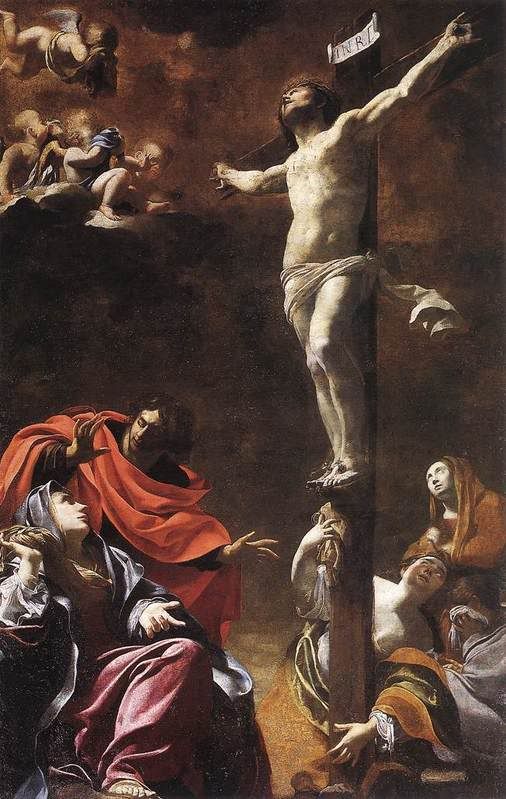
For Private Use Only.
Heart of Jesus in the Eucharist,
I adore Thee.
Sweet Companion of our exile,
I adore Thee.
Eucharistic Heart of Jesus, etc.
Heart solitary, Heart humiliated,
Heart abandoned, Heart forgotten,
Heart despised, Heart outraged,
Heart ignored by men,
Heart, Lover of our hearts,
Heart pleading for love,
Heart patient in waiting for us,
Heart eager to hear our prayers,
Heart desiring that we should pray to Thee,
Heart, Source of fresh graces,
Heart silent, desiring to speak to souls,
Heart, sweet Refuge of the hidden life,
Heart, Teacher of the secrets of union with God,
Heart of Him Who sleeps, yet ever watches,
Eucharistic Heart of Jesus, have mercy on us.
Jesus Victim, I wish to comfort Thee; I unite myself to Thee;
I offer myself in union with Thee. I count myself as nothing before Thee;
I desire to forget myself in order to think of Thee, to be forgotten and despised
for love of Thee, not to be understood, not to be loved, except by Thee.
I will hold my peace that I may listen to Thee; I will forsake myself that
I may lose myself in Thee.
Grant that I may quench Thy thirst for my salvation,
Thy burning thirst for my sanctification, and that, being purified,
I may bestow on Thee a pure and true love. I would no longer weary
Thine expectations; take me, I give myself to Thee. I entrust to Thee all my actions-----
my mind that Thou mayest enlighten it, my heart that Thou mayest direct it,
my will that Thou mayest establish it, my misery that Thou mayest relieve it,
my soul and my body that Thou mayest feed them.
Eucharistic Heart of my Jesus, Whose Blood is the life of my soul,
may it be no longer I who live, but Thou alone Who livest in me. R. Amen.
Labels: Restorationists
Daily Marian Prayer And Image During the Month Of May
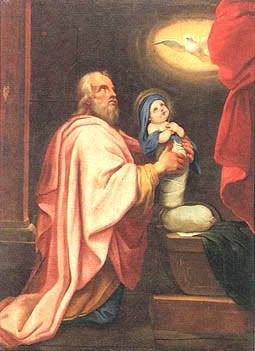
From The Glories Of Mary, By Saint Alphonsus Liguori:
O holy and heavenly Infant, Thou who art the destined Mother of my Redeemer and the great mediatress of miserable sinners, pity me. Behold at thy feet another ungrateful sinner who has recourse to thee and asks thy compassion.
It is true, that for my ingratitude to God and to thee I deserve that God and thou should abandon me; but I have heard, and believe it to be so (knowing the greatness of thy mercy), that thou dost not refuse to help any one who recommends himself to thee with confidence.
O most exalted creature in the world! since this is the case, and since there is no one but God above thee, so that compared with thee the greatest saints of heaven are little; O saint of saints, O Mary! abyss of charity, and full of grace, succor a miserable creature who by his own fault has lost the divine favor.
I know that thou art so dear to God that he denies thee nothing. I know also that thy pleasure is to use thy greatness for the relief of miserable sinners. Then, show how great is the favor that thou enjoyest with God, by obtaining me a divine light and flame so powerful that I may be changed from a sinner into a saint; and detaching myself from every earthly affection, divine love may be enkindled in me. Do this, O Lady, for thou canst do it. Do it for the love of God, who has made thee so great, so powerful, and so compassionate. This is my hope.
Amen.
Labels: Restorationists
Thursday, May 22, 2008
Marian Eucharistic Images
Since Corpus Christi falls unusually early this year, in the Marian month of May, instead of the more typical June (because of the unusually early Easter) I thought it might be good to treat the audience to some Marian Eucharistic images from my collection.
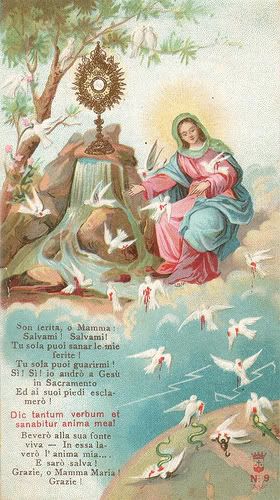
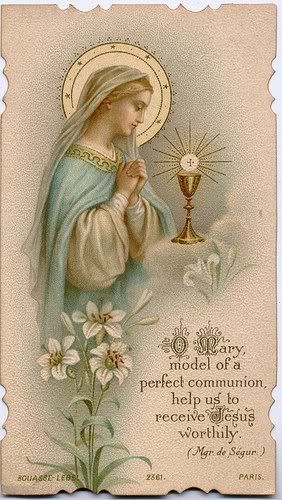
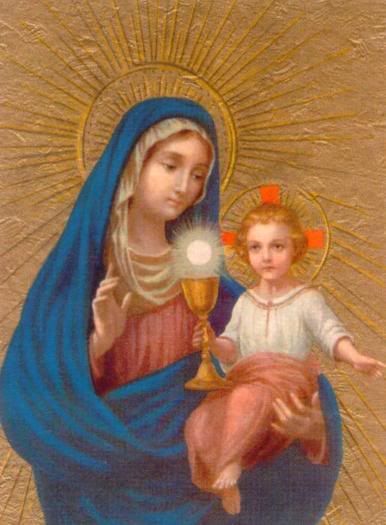
My Own Daily Spiritual Communion Prayer
Immaculate Heart of Mary, Mother of God, and Mediatrix of all graces, I truly believe that the Body and Blood, Soul and Divinity of thy dearly beloved Son, our Lord and Saviour Jesus Christ, is truly, really, and substantially present in the Most Blessed Sacrament of the Altar.
I love Him above all things, and more than all things. But I know that I am not worthy now to receive Him sacramentally. Dear Mother, please be so good as to place Jesus, spiritually, in my mind, my heart, and my soul.
Come, Lord Jesus, come! Enter at our Mother's prompting, into my mind, my heart, and my soul. Chase away Satan and all of his demons and the effects of the Seven Deadly Sins in my life, and fill me instead with Thy grace, peace, joy, and charity.
(Pause a moment).
O Lord, I embrace Thee as one already come, and I unite myself entirely to Thy Sacred Heart. Never permit me to separate myself so far from Thee again, and hasten the day when I may worthily receive Thee sacramentally. I thank thee, Immaculate Heart of my Mother, for bringing Him to me, and me to Him.
Amen.
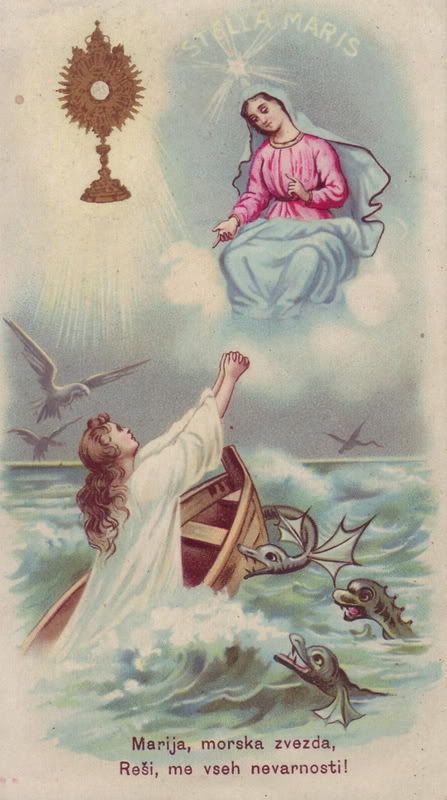
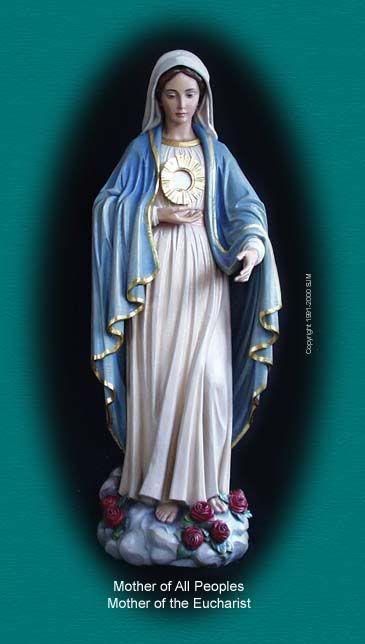



My Own Daily Spiritual Communion Prayer
Immaculate Heart of Mary, Mother of God, and Mediatrix of all graces, I truly believe that the Body and Blood, Soul and Divinity of thy dearly beloved Son, our Lord and Saviour Jesus Christ, is truly, really, and substantially present in the Most Blessed Sacrament of the Altar.
I love Him above all things, and more than all things. But I know that I am not worthy now to receive Him sacramentally. Dear Mother, please be so good as to place Jesus, spiritually, in my mind, my heart, and my soul.
Come, Lord Jesus, come! Enter at our Mother's prompting, into my mind, my heart, and my soul. Chase away Satan and all of his demons and the effects of the Seven Deadly Sins in my life, and fill me instead with Thy grace, peace, joy, and charity.
(Pause a moment).
O Lord, I embrace Thee as one already come, and I unite myself entirely to Thy Sacred Heart. Never permit me to separate myself so far from Thee again, and hasten the day when I may worthily receive Thee sacramentally. I thank thee, Immaculate Heart of my Mother, for bringing Him to me, and me to Him.
Amen.


Labels: Restorationists
Corpus Christi
Today should be the feast of Corpus Christi, though, even in parishes where the traditional Mass is said, it is usually transferred to this coming Sunday.

O Sacrum Convium
O Sacrum convivium, in quo Christus sumitur: recolitur memoria passionis eius; mens impletur gratia et futurae gloriae nobis pignus datur.
V. Panem de caelo praestitisti eis;
R. Omne delectamentum in se habentem.
Oremus:
Deus, qui nobis sub Sacramento mirabili Passionis tuae memoriam reliquisti; tribue, Per desiderium illud, quo hoc Pascha cum discipulis manducare desiderasti, quaesumus, ita nos Corporis et Sanguinis tui sacra mysteria venerari, ut redemptionis tuae fructum in nobis iugiter sentiamus: Qui vivis et regnas in saecula saeculorum.
Amen.
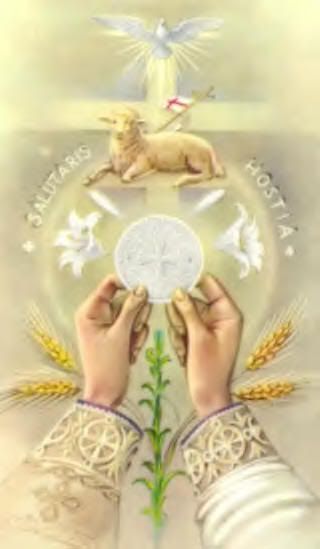
O Salutaris Hostia
O Salutaris Hostia
Quae caeli pandis ostium.
Bella premunt hostilia;
Da robur, fer auxilium.
Uni trinoque Domino
Sit sempiterna gloria:
Qui vitam sine termino,
Nobis donet in patria.
Amen.
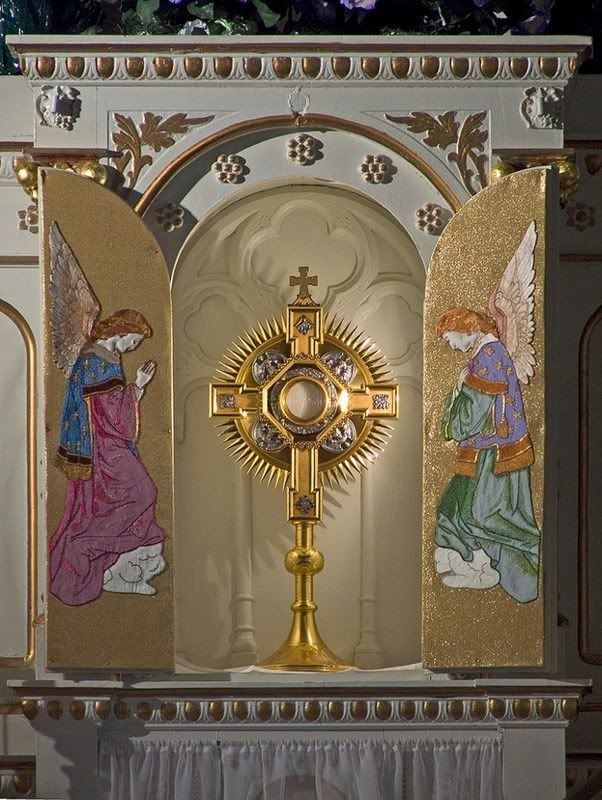
Photo courtesy of Mark Scott Ablen, of Rome Of the West
Christi Corpus, ave, sancta de virgine natum,
Viva caro, Deitas integra, verus homo.
Salve vera salus, vis, vita, redemptio mundi
Liberet a cunctis nos tua dextera malis.
Christi Sanguis, ave, caeli sanctissime potus,
Unda salutaris crimina nostra lavans.
Sanguis ave lateris Christi de vulnere sparse,
In cruce pendens unda salutaris, ave.

Ave Verum Corpus Natum
Ave verum Corpus natum
De Maria Virgine:
Vere passum, immolatum
In cruce pro homine:
Cuius latus perforatum
Fluxit aqua et sanguine:
Esto nobis praegustatum
Mortis in examine.
O Iesu dulcis!
O Iesu pie!
O Iesu Fili Mariae.
Amen.
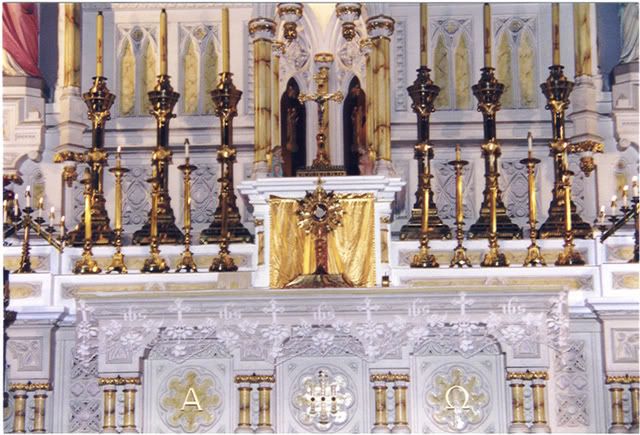
Adoro Te Devote
Adoro te devote, latens Deitas,
quae sub his figuris vere latitas:
tibi se cor meum totum subiicit,
quia te contemplans totum deficit.
Visus, tactus, gustus in te fallitur,
sed auditu solo tuto creditur;
credo quidquid dixit Dei Filius:
nil hoc verbo Veritatis verius.
In cruce latebat sola Deitas,
at hic latet simul et humanitas;
ambo tamen credens atque confitens,
peto quod petivit latro paenitens.
Plagas, sicut Thomas, non intueor;
Deum tamen meum te confiteor;
fac me tibi semper magis credere,
in te spem habere, te diligere.
O memoriale mortis Domini!
panis vivus, vitam praestans homini!
praesta meae menti de te vivere
et te illi semper dulce sapere.
Pie pellicane, Iesu Domine,
me immundum munda tuo sanguine;
cuius una stilla salvum facere
totum mundum quit ab omni scelere.
Iesu, quem velatum nunc aspicio,
oro fiat illud quod tam sitio;
ut te revelata cernens facie,
visu sim beatus tuae gloriae.
Amen.
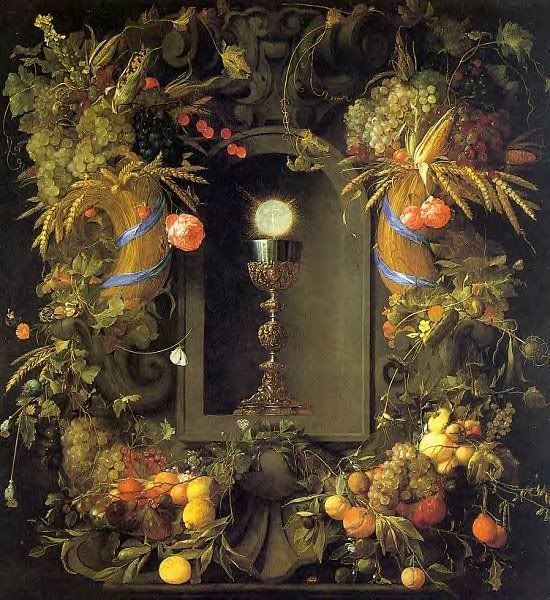
Sacris Solemniis
Sacris solemniis
iuncta sint gaudia,
et ex praecordiis
sonent praeconia;
recedant vetera,
nova sint omnia,
corda, voces, et opera.
Noctis recolitur
cena novissima,
qua Christus creditur
agnum et azyma
dedisse fratribus,
iuxta legitima
priscis indulta patribus.
Post agnum typicum,
expletis epulis,
Corpus Dominicum
datum discipulis,
sic totum omnibus,
quod totum singulis,
eius fatemur manibus.
Dedit fragilibus
corporis ferculum,
dedit et tristibus
sanguinis poculum,
dicens: Accipite
quod trado vasculum;
omnes ex eo bibite.
Sic sacrificium
istud instituit,
cuius officium
committi voluit
solis presbyteris,
quibus sic congruit,
ut sumant, et dent ceteris.
Amen.
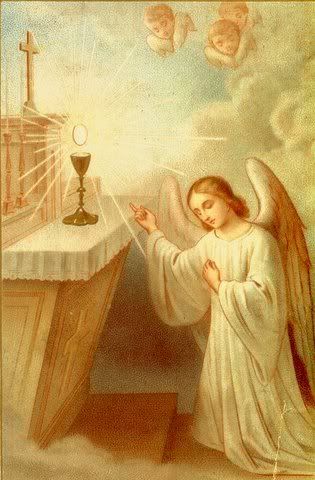
Panis Angelicus
Panis angelicus
fit panis hominum;
dat panis caelicus
figuris terminum;
O res mirabilis:
manducat Dominum
pauper, servus et humilis.
Te, trina Deitas
unaque, poscimus:
sic nos tu visita,
sicut te colimus;
per tuas semitas
duc nos quo tendimus,
ad lucem quam inhabitas.
Amen.
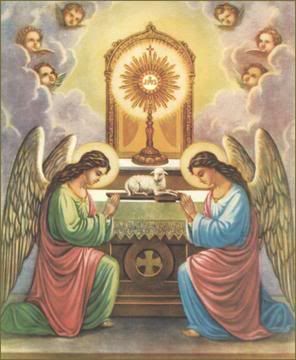
Verbum Supernum
Verbum supernum prodiens,
nec Patris linquens dexteram,
ad opus suum exiens,
venit ad vitae vesperam.
In mortem a discipulo
suis tradendus aemulis,
prius in vitae ferculo
se tradidit discipulis.
Quibus sub bina specie
carnem dedit et sanguinem;
ut duplicis substantiae
totum cibaret hominem.
Se nascens dedit socium,
convescens in edulium,
se moriens in pretium,
se regnans dat in praemium.
Amen.
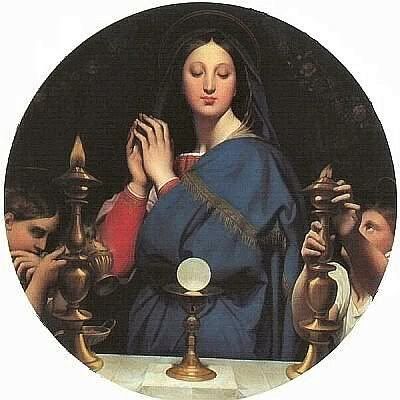
Lauda Sion
Lauda Sion Salvatorem,
lauda ducem et pastorem,
in hymnis et canticis.
Quantum potes, tantum aude:
quia maior omni laude,
nec laudare sufficis.
Laudis thema specialis,
panis vivus et vitalis
hodie proponitur.
Quem in sacrae mensa cenae,
turbae fratrum duodenae
datum non ambigitur.
Sit laus plena, sit sonora,
sit iucunda, sit decora
mentis iubilatio.
Dies enim solemnis agitur,
in qua mensae prima recolitur
huius institutio.
In hac mensa novi Regis,
novum Pascha novae legis,
phase vetus terminat.
Vetustatem novitas,
umbram fugat veritas,
noctem lux eliminat.
Quod in coena Christus gessit,
faciendum hoc expressit
in sui memoriam.
Docti sacris institutis,
panem, vinum in salutis
consecramus hostiam.
Dogma datur christianis,
quod in carnem transit panis,
et vinum in sanguinem.
Quod non capis, quod non vides,
animosa firmat fides,
praeter rerum ordinem.
Sub diversis speciebus,
signis tantum, et non rebus,
latent res eximiae.
Caro cibus, sanguis potus:
manet tamen Christus totus
sub utraque specie.
A sumente non concisus,
non confractus, non divisus:
integer accipitur.
Sumit unus, sumunt mille:
quantum isti, tantum ille:
nec sumptus consumitur.
Sumunt boni, sumunt mali:
sorte tamen inaequali,
vitae vel interitus.
Mors est malis, vita bonis:
vide paris sumptionis
quam sit dispar exitus.
Fracto demum sacramento,
ne vacilles, sed memento
tantum esse sub fragmento,
quantum toto tegitur.
Nulla rei fit scissura:
signi tantum fit fractura,
qua nec status, nec statura
signati minuitur.
Ecce Panis Angelorum,
factus cibus viatorum:
vere panis filiorum,
non mittendus canibus.
In figuris praesignatur,
cum Isaac immolatur,
agnus Paschae deputatur,
datur manna patribus.
Bone pastor, panis vere,
Iesu, nostri miserere:
Tu nos pasce, nos tuere,
Tu nos bona fac videre
in terra viventium.
Tu qui cuncta scis et vales,
qui nos pascis hic mortales:
tuos ibi commensales,
coheredes et sodales
fac sanctorum civium.
Amen. Alleluia.
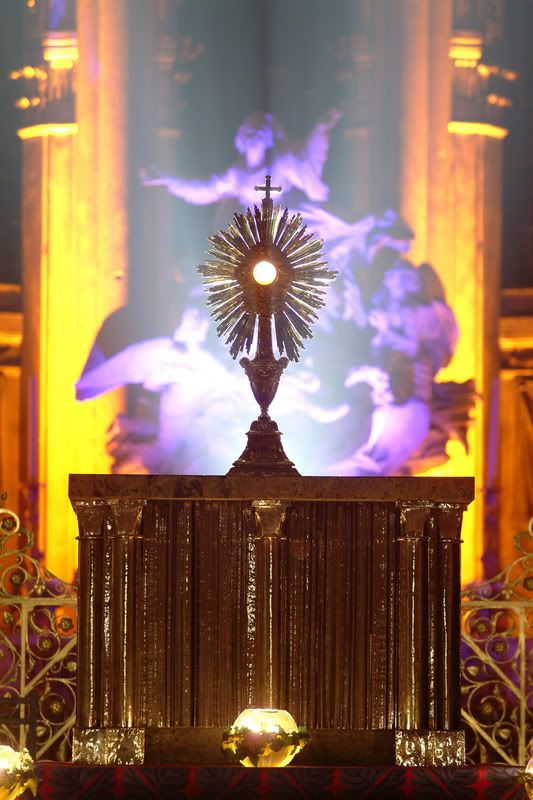
Salve, salutaris Victima, pro me et omni humano genere in patibulo crucis oblata. Salve, pretiose sanguis, de vulneribus crucifixi Domini nostri Iesu Christi profluens, et peccata totius mundi abluens. Recordare, Domine, creaturae tuae, quam tuo pretioso sanguine redemisti.
Amen.
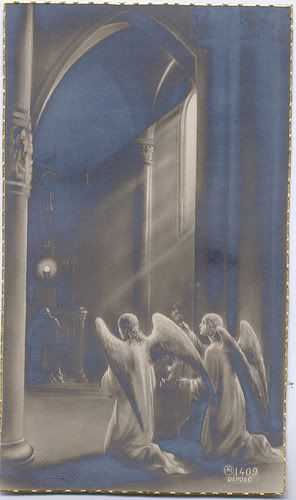
Tantum Ergo
Tantum ergo Sacramentum
Veneremur cernui:
Et antiquum documentum
Novo cedat ritui:
Praestet fides supplementum
Sensuum defectui.
Genitori, Genitoque
Laus et iubilatio,
Salus, honor, virtus quoque
Sit et benedictio:
Procedenti ab utroque
Compar sit laudatio.
Amen.
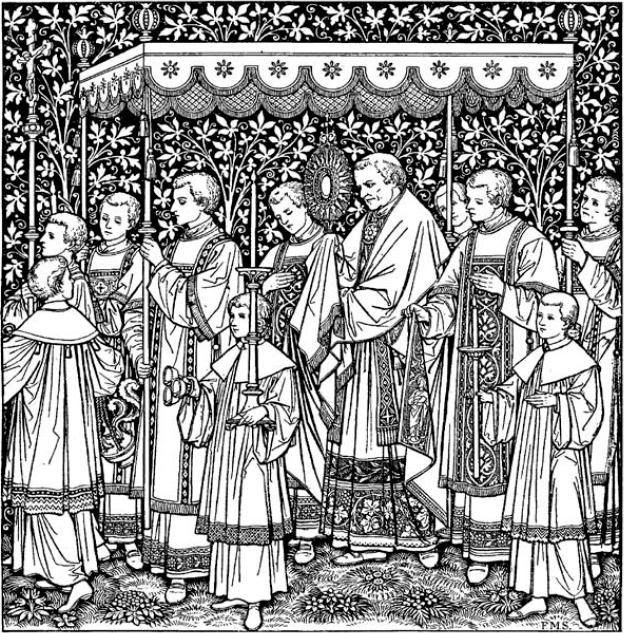
Laudes Divinae
Benedictus Deus.
Benedictus Nomen Sanctum eius.
Benedictus Iesus Christus, verus Deus et verus homo.
Benedictum Nomen Iesu.
Benedictum Cor eius sacratissimum.
Benedictus Sanguis eius pretiosissimus.
Benedictus Iesus in sanctissimo altaris Sacramento.
Benedictus Sanctus Spiritus, Paraclitus.
Benedicta excelsa Mater Dei, Maria sanctissima.
Benedicta sancta eius et immaculata Conceptio.
Benedicta eius gloriosa Assumptio.
Benedictum nomen Mariae, Virginis et Matris.
Benedictus sanctus Ioseph, eius castissimus Sponsus.
Benedictus Deus in Angelis suis, et in Sanctis suis.
Amen.
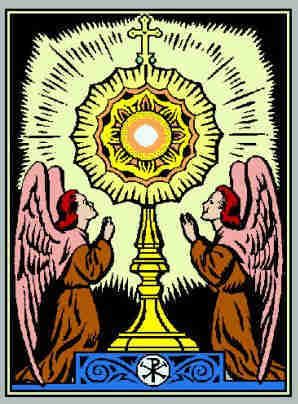
Litaniae de Sanctissimo Sacramento
Kyrie, eleison
R. Kyrie, eleison
Christe, eleison
R. Christe, eleison.
Kyrie, eleison
R. Kyrie, eleison.
Christe, audi nos
R. Christe, audi nos.
Christe, exaudi nos.
R. Christe, exaudi nos.
Pater de caelis, Deus,
R. miserere nobis.
Fili, Redemptor mundi, Deus,
R. miserere nobis.
Spiritus Sancte, Deus,
R. miserere nobis.
Sancta Trinitas, unus Deus,
R. miserere nobis.
Panis vive, qui de caelo descendisti,
R. miserere nobis.
Deus absconditus et Salvator,
R. miserere nobis.
Frumentum electorum,
R. miserere nobis.
Vinum germinans virgines,
R. miserere nobis.
Panis pinguis et deliciae regum,
R. miserere nobis.
Iuge sacrificium,
R. miserere nobis.
Oblatio munda,
R. miserere nobis.
Agne absque macula,
R. miserere nobis.
Mensa purissima,
R. miserere nobis.
Angelorum esca,
R. miserere nobis.
Manna absconditum,
R. miserere nobis.
Memoria mirabilium Dei,
R. miserere nobis.
Panis supersubstantialis,
R. miserere nobis.
Verbum caro factum, habitans in nobis,
R. miserere nobis.
Hostia sancta,
R. miserere nobis.
Calix benedictionis,
R. miserere nobis.
Mysterium fidei,
R. miserere nobis.
Praecelsum et venerabile Sacramentum,
R. miserere nobis.
Sacrificium omnium sanctissimum,
R. miserere nobis.
Sacrificium vere propitiatorium pro vivis et defunctis,
R. miserere nobis.
Caeleste antidotum, quo a peccatis praeservamur,
R. miserere nobis.
Stupendum supra omnia miraculum,
R. miserere nobis.
Sacratissima Dominicae Passionis commemoratio,
R. miserere nobis.
Donum transcendens omnem plenitudinem,
R. miserere nobis.
Memoriale praecipuum divini amoris,
R. miserere nobis.
Divinae affluentia largitatis,
R. miserere nobis.
Sacrosanctum et augustissimum mysterium,
R. miserere nobis.
Pharmacum immortalitatis,
R. miserere nobis.
Tremendum ac vivificum Sacramentum,
R. miserere nobis.
Panis omnipotentia Verbi caro factus,
R. miserere nobis.
Incruentum sacrificium,
R. miserere nobis.
Cibus et convivia,
R. miserere nobis.
Dulcissimum convivium, cui assistunt Angeli ministrantes,
R. miserere nobis.
Sacramentum pietatis,
R. miserere nobis.
Vinculum caritatis,
R. miserere nobis.
Offerens et oblatio,
R. miserere nobis.
Spiritualis dulcedo in proprio fonte degustata,
R. miserere nobis.
Refectio animarum sanctarum,
R. miserere nobis.
Viaticum in Domino morientium,
R. miserere nobis.
Pignus futurae gloriae,
R. miserere nobis.
Propitius esto,
R. parce nobis, Domine.
Propitius esto,
R. exaudi nos, Domine.
Ab indigna Corporis et Sanguinis tui susceptione,
R. libera nos, Domine.
A concupiscentia carnis,
R. libera nos, Domine.
A concupiscentia oculorum,
R. libera nos, Domine.
A superbia vitae,
R. libera nos, Domine.
Ab omni peccandi occasione,
R. libera nos, Domine.
Per desiderium illud, quo hoc Pascha cum discipulis manducare desiderasti,
R. libera nos, Domine.
Per summam humilitatem, qui discipulorum pedes lavisti,
R. libera nos, Domine.
Per ardentissimam caritatem, qua hoc divinum Sacramentum instituisti,
R. libera nos, Domine.
Per Sanguinem tuum pretiosum, quem nobis in altari reliquisti,
R. libera nos, Domine.
Per quinque vulnera huius tui Corporis sacratissimi, quod pro nobis suscepisti,
R. libera nos, Domine.
Peccatores,
R. te rogamus, audi nos.
Ut in nobis fidem, reverentiam et devotionem erga hoc admirabile Sacramentum augere et conservare digneris,
R. te rogamus, audi nos.
Ut ad frequentem usum Eucharistiae per veram peccatorum confessionem nos perducere digneris,
R. te rogamus, audi nos.
Ut nos ab omni haeresi, perfidia ac cordis caecitate liberare digneris,
R. te rogamus, audi nos.
Ut sanctissimi huius Sacramenti pretiosos et caelestes fructus nobis impertiri digneris,
R. te rogamus, audi nos.
Ut in hora mortis nostrae hoc caelesti viatico nos confortare et munire digneris,
R. te rogamus, audi nos.
Fili Dei,
R. te rogamus, audi nos.
Agnus Dei, qui tollis peccata mundi,
R. parce nobis, Domine.
Agnus Dei, qui tollis peccata mundi,
R. exaudi nos, Domine.
Agnus Dei, qui tollis peccata mundi,
R. miserere nobis, Domine.
Christe, audi nos
R. Christe, audi nos.
Christe, exaudi nos.
R. Christe, exaudi nos.
Kyrie, eleison
R. Kyrie, eleison
Christe, eleison
R. Christe, eleison.
Kyrie, eleison
R. Kyrie, eleison.
Pater Noster ...
Ave Maria, ...
V. Panem de caelo praestitisti eis,
R. Omne delectamentum in se habentem.
Oremus;
Deus, qui nobis sub Sacramento mirabili Passionis tuae memoriam reliquisti; tribue quaesumus, ita nos Corporis et Sanguinis tui sacra mysteria venerari, ut redemptionis tuae fructum in nobis iugiter sentiamus. Qui vivis et regnas in saecula saeculorum. Amen.
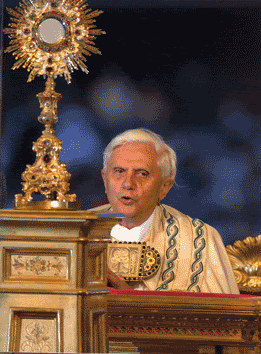

O Sacrum Convium
O Sacrum convivium, in quo Christus sumitur: recolitur memoria passionis eius; mens impletur gratia et futurae gloriae nobis pignus datur.
V. Panem de caelo praestitisti eis;
R. Omne delectamentum in se habentem.
Oremus:
Deus, qui nobis sub Sacramento mirabili Passionis tuae memoriam reliquisti; tribue, Per desiderium illud, quo hoc Pascha cum discipulis manducare desiderasti, quaesumus, ita nos Corporis et Sanguinis tui sacra mysteria venerari, ut redemptionis tuae fructum in nobis iugiter sentiamus: Qui vivis et regnas in saecula saeculorum.
Amen.

O Salutaris Hostia
O Salutaris Hostia
Quae caeli pandis ostium.
Bella premunt hostilia;
Da robur, fer auxilium.
Uni trinoque Domino
Sit sempiterna gloria:
Qui vitam sine termino,
Nobis donet in patria.
Amen.

Photo courtesy of Mark Scott Ablen, of Rome Of the West
Christi Corpus, ave, sancta de virgine natum,
Viva caro, Deitas integra, verus homo.
Salve vera salus, vis, vita, redemptio mundi
Liberet a cunctis nos tua dextera malis.
Christi Sanguis, ave, caeli sanctissime potus,
Unda salutaris crimina nostra lavans.
Sanguis ave lateris Christi de vulnere sparse,
In cruce pendens unda salutaris, ave.

Ave Verum Corpus Natum
Ave verum Corpus natum
De Maria Virgine:
Vere passum, immolatum
In cruce pro homine:
Cuius latus perforatum
Fluxit aqua et sanguine:
Esto nobis praegustatum
Mortis in examine.
O Iesu dulcis!
O Iesu pie!
O Iesu Fili Mariae.
Amen.

Adoro Te Devote
Adoro te devote, latens Deitas,
quae sub his figuris vere latitas:
tibi se cor meum totum subiicit,
quia te contemplans totum deficit.
Visus, tactus, gustus in te fallitur,
sed auditu solo tuto creditur;
credo quidquid dixit Dei Filius:
nil hoc verbo Veritatis verius.
In cruce latebat sola Deitas,
at hic latet simul et humanitas;
ambo tamen credens atque confitens,
peto quod petivit latro paenitens.
Plagas, sicut Thomas, non intueor;
Deum tamen meum te confiteor;
fac me tibi semper magis credere,
in te spem habere, te diligere.
O memoriale mortis Domini!
panis vivus, vitam praestans homini!
praesta meae menti de te vivere
et te illi semper dulce sapere.
Pie pellicane, Iesu Domine,
me immundum munda tuo sanguine;
cuius una stilla salvum facere
totum mundum quit ab omni scelere.
Iesu, quem velatum nunc aspicio,
oro fiat illud quod tam sitio;
ut te revelata cernens facie,
visu sim beatus tuae gloriae.
Amen.

Sacris Solemniis
Sacris solemniis
iuncta sint gaudia,
et ex praecordiis
sonent praeconia;
recedant vetera,
nova sint omnia,
corda, voces, et opera.
Noctis recolitur
cena novissima,
qua Christus creditur
agnum et azyma
dedisse fratribus,
iuxta legitima
priscis indulta patribus.
Post agnum typicum,
expletis epulis,
Corpus Dominicum
datum discipulis,
sic totum omnibus,
quod totum singulis,
eius fatemur manibus.
Dedit fragilibus
corporis ferculum,
dedit et tristibus
sanguinis poculum,
dicens: Accipite
quod trado vasculum;
omnes ex eo bibite.
Sic sacrificium
istud instituit,
cuius officium
committi voluit
solis presbyteris,
quibus sic congruit,
ut sumant, et dent ceteris.
Amen.

Panis Angelicus
Panis angelicus
fit panis hominum;
dat panis caelicus
figuris terminum;
O res mirabilis:
manducat Dominum
pauper, servus et humilis.
Te, trina Deitas
unaque, poscimus:
sic nos tu visita,
sicut te colimus;
per tuas semitas
duc nos quo tendimus,
ad lucem quam inhabitas.
Amen.

Verbum Supernum
Verbum supernum prodiens,
nec Patris linquens dexteram,
ad opus suum exiens,
venit ad vitae vesperam.
In mortem a discipulo
suis tradendus aemulis,
prius in vitae ferculo
se tradidit discipulis.
Quibus sub bina specie
carnem dedit et sanguinem;
ut duplicis substantiae
totum cibaret hominem.
Se nascens dedit socium,
convescens in edulium,
se moriens in pretium,
se regnans dat in praemium.
Amen.

Lauda Sion
Lauda Sion Salvatorem,
lauda ducem et pastorem,
in hymnis et canticis.
Quantum potes, tantum aude:
quia maior omni laude,
nec laudare sufficis.
Laudis thema specialis,
panis vivus et vitalis
hodie proponitur.
Quem in sacrae mensa cenae,
turbae fratrum duodenae
datum non ambigitur.
Sit laus plena, sit sonora,
sit iucunda, sit decora
mentis iubilatio.
Dies enim solemnis agitur,
in qua mensae prima recolitur
huius institutio.
In hac mensa novi Regis,
novum Pascha novae legis,
phase vetus terminat.
Vetustatem novitas,
umbram fugat veritas,
noctem lux eliminat.
Quod in coena Christus gessit,
faciendum hoc expressit
in sui memoriam.
Docti sacris institutis,
panem, vinum in salutis
consecramus hostiam.
Dogma datur christianis,
quod in carnem transit panis,
et vinum in sanguinem.
Quod non capis, quod non vides,
animosa firmat fides,
praeter rerum ordinem.
Sub diversis speciebus,
signis tantum, et non rebus,
latent res eximiae.
Caro cibus, sanguis potus:
manet tamen Christus totus
sub utraque specie.
A sumente non concisus,
non confractus, non divisus:
integer accipitur.
Sumit unus, sumunt mille:
quantum isti, tantum ille:
nec sumptus consumitur.
Sumunt boni, sumunt mali:
sorte tamen inaequali,
vitae vel interitus.
Mors est malis, vita bonis:
vide paris sumptionis
quam sit dispar exitus.
Fracto demum sacramento,
ne vacilles, sed memento
tantum esse sub fragmento,
quantum toto tegitur.
Nulla rei fit scissura:
signi tantum fit fractura,
qua nec status, nec statura
signati minuitur.
Ecce Panis Angelorum,
factus cibus viatorum:
vere panis filiorum,
non mittendus canibus.
In figuris praesignatur,
cum Isaac immolatur,
agnus Paschae deputatur,
datur manna patribus.
Bone pastor, panis vere,
Iesu, nostri miserere:
Tu nos pasce, nos tuere,
Tu nos bona fac videre
in terra viventium.
Tu qui cuncta scis et vales,
qui nos pascis hic mortales:
tuos ibi commensales,
coheredes et sodales
fac sanctorum civium.
Amen. Alleluia.

Salve, salutaris Victima, pro me et omni humano genere in patibulo crucis oblata. Salve, pretiose sanguis, de vulneribus crucifixi Domini nostri Iesu Christi profluens, et peccata totius mundi abluens. Recordare, Domine, creaturae tuae, quam tuo pretioso sanguine redemisti.
Amen.

Tantum Ergo
Tantum ergo Sacramentum
Veneremur cernui:
Et antiquum documentum
Novo cedat ritui:
Praestet fides supplementum
Sensuum defectui.
Genitori, Genitoque
Laus et iubilatio,
Salus, honor, virtus quoque
Sit et benedictio:
Procedenti ab utroque
Compar sit laudatio.
Amen.

Laudes Divinae
Benedictus Deus.
Benedictus Nomen Sanctum eius.
Benedictus Iesus Christus, verus Deus et verus homo.
Benedictum Nomen Iesu.
Benedictum Cor eius sacratissimum.
Benedictus Sanguis eius pretiosissimus.
Benedictus Iesus in sanctissimo altaris Sacramento.
Benedictus Sanctus Spiritus, Paraclitus.
Benedicta excelsa Mater Dei, Maria sanctissima.
Benedicta sancta eius et immaculata Conceptio.
Benedicta eius gloriosa Assumptio.
Benedictum nomen Mariae, Virginis et Matris.
Benedictus sanctus Ioseph, eius castissimus Sponsus.
Benedictus Deus in Angelis suis, et in Sanctis suis.
Amen.

Litaniae de Sanctissimo Sacramento
Kyrie, eleison
R. Kyrie, eleison
Christe, eleison
R. Christe, eleison.
Kyrie, eleison
R. Kyrie, eleison.
Christe, audi nos
R. Christe, audi nos.
Christe, exaudi nos.
R. Christe, exaudi nos.
Pater de caelis, Deus,
R. miserere nobis.
Fili, Redemptor mundi, Deus,
R. miserere nobis.
Spiritus Sancte, Deus,
R. miserere nobis.
Sancta Trinitas, unus Deus,
R. miserere nobis.
Panis vive, qui de caelo descendisti,
R. miserere nobis.
Deus absconditus et Salvator,
R. miserere nobis.
Frumentum electorum,
R. miserere nobis.
Vinum germinans virgines,
R. miserere nobis.
Panis pinguis et deliciae regum,
R. miserere nobis.
Iuge sacrificium,
R. miserere nobis.
Oblatio munda,
R. miserere nobis.
Agne absque macula,
R. miserere nobis.
Mensa purissima,
R. miserere nobis.
Angelorum esca,
R. miserere nobis.
Manna absconditum,
R. miserere nobis.
Memoria mirabilium Dei,
R. miserere nobis.
Panis supersubstantialis,
R. miserere nobis.
Verbum caro factum, habitans in nobis,
R. miserere nobis.
Hostia sancta,
R. miserere nobis.
Calix benedictionis,
R. miserere nobis.
Mysterium fidei,
R. miserere nobis.
Praecelsum et venerabile Sacramentum,
R. miserere nobis.
Sacrificium omnium sanctissimum,
R. miserere nobis.
Sacrificium vere propitiatorium pro vivis et defunctis,
R. miserere nobis.
Caeleste antidotum, quo a peccatis praeservamur,
R. miserere nobis.
Stupendum supra omnia miraculum,
R. miserere nobis.
Sacratissima Dominicae Passionis commemoratio,
R. miserere nobis.
Donum transcendens omnem plenitudinem,
R. miserere nobis.
Memoriale praecipuum divini amoris,
R. miserere nobis.
Divinae affluentia largitatis,
R. miserere nobis.
Sacrosanctum et augustissimum mysterium,
R. miserere nobis.
Pharmacum immortalitatis,
R. miserere nobis.
Tremendum ac vivificum Sacramentum,
R. miserere nobis.
Panis omnipotentia Verbi caro factus,
R. miserere nobis.
Incruentum sacrificium,
R. miserere nobis.
Cibus et convivia,
R. miserere nobis.
Dulcissimum convivium, cui assistunt Angeli ministrantes,
R. miserere nobis.
Sacramentum pietatis,
R. miserere nobis.
Vinculum caritatis,
R. miserere nobis.
Offerens et oblatio,
R. miserere nobis.
Spiritualis dulcedo in proprio fonte degustata,
R. miserere nobis.
Refectio animarum sanctarum,
R. miserere nobis.
Viaticum in Domino morientium,
R. miserere nobis.
Pignus futurae gloriae,
R. miserere nobis.
Propitius esto,
R. parce nobis, Domine.
Propitius esto,
R. exaudi nos, Domine.
Ab indigna Corporis et Sanguinis tui susceptione,
R. libera nos, Domine.
A concupiscentia carnis,
R. libera nos, Domine.
A concupiscentia oculorum,
R. libera nos, Domine.
A superbia vitae,
R. libera nos, Domine.
Ab omni peccandi occasione,
R. libera nos, Domine.
Per desiderium illud, quo hoc Pascha cum discipulis manducare desiderasti,
R. libera nos, Domine.
Per summam humilitatem, qui discipulorum pedes lavisti,
R. libera nos, Domine.
Per ardentissimam caritatem, qua hoc divinum Sacramentum instituisti,
R. libera nos, Domine.
Per Sanguinem tuum pretiosum, quem nobis in altari reliquisti,
R. libera nos, Domine.
Per quinque vulnera huius tui Corporis sacratissimi, quod pro nobis suscepisti,
R. libera nos, Domine.
Peccatores,
R. te rogamus, audi nos.
Ut in nobis fidem, reverentiam et devotionem erga hoc admirabile Sacramentum augere et conservare digneris,
R. te rogamus, audi nos.
Ut ad frequentem usum Eucharistiae per veram peccatorum confessionem nos perducere digneris,
R. te rogamus, audi nos.
Ut nos ab omni haeresi, perfidia ac cordis caecitate liberare digneris,
R. te rogamus, audi nos.
Ut sanctissimi huius Sacramenti pretiosos et caelestes fructus nobis impertiri digneris,
R. te rogamus, audi nos.
Ut in hora mortis nostrae hoc caelesti viatico nos confortare et munire digneris,
R. te rogamus, audi nos.
Fili Dei,
R. te rogamus, audi nos.
Agnus Dei, qui tollis peccata mundi,
R. parce nobis, Domine.
Agnus Dei, qui tollis peccata mundi,
R. exaudi nos, Domine.
Agnus Dei, qui tollis peccata mundi,
R. miserere nobis, Domine.
Christe, audi nos
R. Christe, audi nos.
Christe, exaudi nos.
R. Christe, exaudi nos.
Kyrie, eleison
R. Kyrie, eleison
Christe, eleison
R. Christe, eleison.
Kyrie, eleison
R. Kyrie, eleison.
Pater Noster ...
Ave Maria, ...
V. Panem de caelo praestitisti eis,
R. Omne delectamentum in se habentem.
Oremus;
Deus, qui nobis sub Sacramento mirabili Passionis tuae memoriam reliquisti; tribue quaesumus, ita nos Corporis et Sanguinis tui sacra mysteria venerari, ut redemptionis tuae fructum in nobis iugiter sentiamus. Qui vivis et regnas in saecula saeculorum. Amen.

Labels: Restorationists
Daily Marian Prayer And Image During the Month Of May
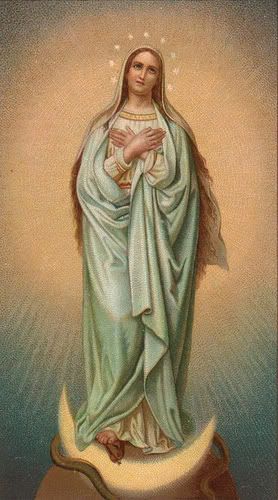
From The Glories Of Mary, by Saint Alphonsus Liguori:
O, my Immaculate Lady! I rejoice with thee on seeing thee enriched with so great purity. I thank, and, resolve always to thank, our common Creator for having preserved thee from every stain of sin; and I firmly believe this doctrine, and am prepared and swear even to lay down my life, should this be necessary, in defence of this thy so great and singular privilege of being conceived immaculate.
I would that the whole world knew thee and acknowledged thee as being that beautiful "Dawn" which was always illumined with divine light; as that chosen "Ark" of salvation, free from the common shipwreck of sin; that perfect and immaculate "Dove" which thy divine Spouse declared thee to be; that "enclosed Garden" which was the delight of God; that "sealed Founain" whose waters were never troubled by an enemy; and finally, as that "white Lily," which thou art, and who, though born in the midst of the thorns of the children of Adam, all of whom are conceived in sin, and the enemies of God, wast alone conceived pure and spotless, and in all things the beloved of thy Creator.
Permit me, then, to praise thee also as thy God himself has praised thee: Thou art all fair, and there is not a spot in thee ("Tota pulchra es, Amica mea, et macula non est in te"�Cant. iv. 7). O most pure Dove, all fair, all beautiful, always the friend of God. O how beautiful art thou, my beloved! How beautiful art thou! ("Quam pulchra es, amica mea, quam pulchra es!"�Ib. 1).
Most sweet, most amiable, immaculate Mary, thou who art so beautiful in the eyes of thy Lord, disdain not to cast thy compassionate eyes on the wounds of my soul, loathsome as they are. Behold me, pity me, heal me.
O beautiful loadstone of hearts, draw also my miserable heart to thyself.
O thou, who from the first moment of thy life didst appear pure and beautiful before God, pity me, who not only was born in sin, but have again since baptism stained my soul with crimes.
What grace will God ever refuse thee, who chose thee for his daughter, his Mother, and Spouse, and therefore preserved thee from every stain, and in his love preferred thee to all other creatures? I will say, in the words of St. Philip Neri, "Immaculate Virgin, thou hast to save me."
Grant that I may always remember thee; and thou, do thou never forget me. The happy day, when I shall go to behold thy beauty in Paradise, seems a thousand years off; so much do I long to praise and love thee more than I can now do, my Mother, my Queen, my beloved, most beautiful, most sweet, most pure, Immaculate Mary.
Amen.
Labels: Restorationists
Wednesday, May 21, 2008
Senator Kennedy Has A Malignant Brain Tumor
Doctors speculate that he has less than a year to live.
Although I find just about everything the man has stood for publically, and privately, not just obnoxious to good public order, but actually both toxic and corrosive, and while I think all the legislation he has crafted and supported throughout his entire career has all worked to the detriment of a properly ordered American society, to the hinderance of American economic prosperity, to the diminution of American power both militarily and diplomatically (and I believe a predominantly powerful United States to be the last, best hope for man upon this earth), there is no rejoicing at his ailment.
Prayers are proper for his suffering to be eased, for him to repent of his many sins, including those encased in his voting record which the left wing will attempt to enshrine in new memorial legislation, no doubt, and that his family will suffer less distress during his illness and in his death through the Lord's mercy. May he have a happy and holy death.
It is certainly not too late. Think of the murderous gangster Dutch Schultz, who was shot by other gangsters, and, while lingering in the hospital, requested to see a Catholic priest, was received into Holy Mother the Church, made a full confession, received the Blessed Sacrament, was given the Last Rites, and a Catholic Requiem and burial.
Although I find just about everything the man has stood for publically, and privately, not just obnoxious to good public order, but actually both toxic and corrosive, and while I think all the legislation he has crafted and supported throughout his entire career has all worked to the detriment of a properly ordered American society, to the hinderance of American economic prosperity, to the diminution of American power both militarily and diplomatically (and I believe a predominantly powerful United States to be the last, best hope for man upon this earth), there is no rejoicing at his ailment.
Prayers are proper for his suffering to be eased, for him to repent of his many sins, including those encased in his voting record which the left wing will attempt to enshrine in new memorial legislation, no doubt, and that his family will suffer less distress during his illness and in his death through the Lord's mercy. May he have a happy and holy death.
It is certainly not too late. Think of the murderous gangster Dutch Schultz, who was shot by other gangsters, and, while lingering in the hospital, requested to see a Catholic priest, was received into Holy Mother the Church, made a full confession, received the Blessed Sacrament, was given the Last Rites, and a Catholic Requiem and burial.
Labels: American Patriotism Is Not A Sin
Daily Marian Prayer And Image During the Month Of May
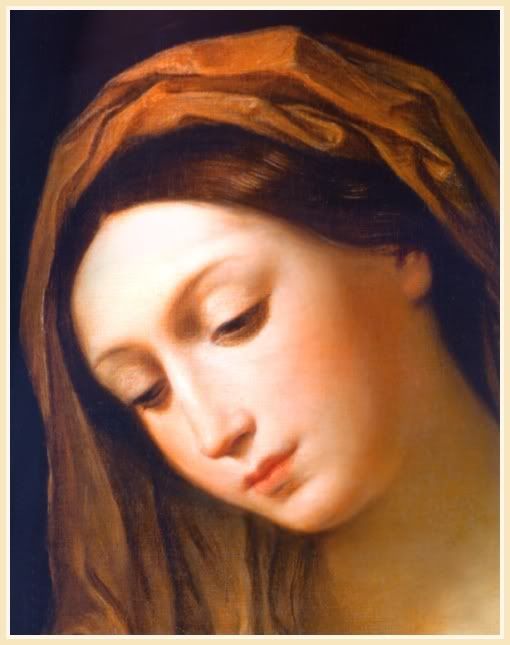
From The Glories Of Mary, by Saint Alphonsus Liguori:
O Mother of mercy, since thou art so compassionate, and hast so great a desire to render service to us poor creatures and to grant our requests, behold I, the most miserable of all men, have now recourse to thy compassion, in order that thou mayest grant me that which I ask. Others may ask what they please of thee,�bodily health, and earthly goods and advantages; but I come, O Lady, to ask thee for that which thou desired of me humility and love of contempt.
Thou wast so patient under the sufferings of this life; obtain for me patience in trials.
Thou wast all filled with the love of God; obtain for me the gift of his pure and holy love.
Thou wast all love towards thy neighbor; obtain for me charity towards all, and particularly towards those who are in any way my enemies.
Thou wast entirely united to the divine will; obtain for me entire conformity to the will of God in whatever way he may be pleased to dispose of me.
Thou, in fine, art the most holy of all creatures; O Mary, make me a saint.
Love for me is not wanting on thy part; thou canst do all, and thou hast the will to obtain me all.
The only thing, then, that can prevent me from receiving thy graces is, either neglect on my part in having recourse to thee, or little confidence in thy intercession; but these two things thou must obtain for me. These two greatest graces I ask from thee; from thee I must obtain them; from thee I hope for them with the greatest confidence, O Mary, my Mother Mary, my hope, my love, my life, my refuge, my help, and my consolation.
Amen.
Labels: Restorationists
Tuesday, May 20, 2008
A NO-NO!

What is it with these young Red Sox pitchers? On September 1st, Clay Bucholz threw a no-hitter at the Baltimore Orioles. Last night, Jon Lester no-hit the Kansas City Royals.
Lester tossed his no-hitter, after being sidelined while he battled cancer.
Way to go!
The Sox remain a game ahead of the surprising Tampa Bay Devil Rays, and considerably ahead of the ultimately far-more-dangerous New York Yankees.
Meanwhile, in other Boston sports news, the Celtics took out the Cleveland Cavaliers in 7 games, winning a not-particularly-well-executed, but nonetheless exciting game at the New Garden on Sunday afternoon. Tonight, they take on the Detroit Pistons at the Garden for the first of another 7-game series.
Labels: Boston Red Sox
Daily Marian Prayer And Image During the Month Of May
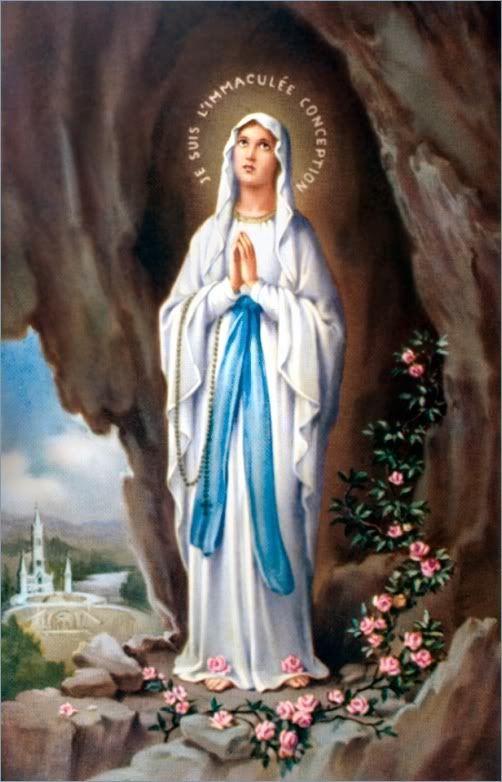
From The Glories Of Mary, by Saint Alphonsus Liguori:
O Queen of heaven, Mother of holy love! since thou art the most amiable of creatures, the most beloved of God, and his greatest lover, be pleased to allow the most miserable sinner living in this world, who, having by thy means been delivered from hell, and without any merit on his part been so benefited by thee and who is filled with love for thee, to love thee.
I would desire, were it in my power, to let all men who know thee not know how worthy thou art of love, that all might love and honor thee. I would desire to die for the love of thee, in defence of thy virginity, of thy dignity of Mother of God, of thy Immaculate Conception, should this be necessary, to uphold these thy great privileges. O my most beloved Mother, accept this my ardent desire, and never allow a servant of thine, who loves thee, to become the enemy of thy God, whom thou lovest so much.
Alas! poor me, I was so for a time, when I offended my Lord. But then, O Mary, I loved thee but little, and strove but little to be beloved by thee. But now there is nothing that I so much desire, after the grace of God, as to love and be loved by thee. I am not discouraged on account of my past sins, for I know that thou, O most benign and gracious Lady, dost not disdain to love even the most wretched sinners who love thee; nay more, that thou never allowest thyself to be surpassed by any in love.
Queen most worthy of love, I desire to love thee in heaven. There, at thy feet, I shall better know how worthy thou art of love, how much thou hast done to save me; and thus I shall love thee with greater love, and love thee eternally, without fear of ever ceasing to love thee.
O Mary, I hope most certainly to be saved by thy means. Pray to Jesus for me. Nothing else is needed; thou hast to save me; thou art my hope. I will therefore always sing O Mary, my hope, thou hast to save me.
Amen.
Labels: Restorationists
Monday, May 19, 2008
Daily Marian Prayer And Image During the Month Of May
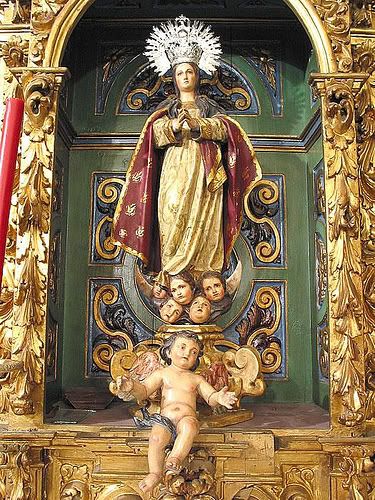
From The Glories Of Mary, by Saint Alphonsus Liguori:
O Queen of heaven and earth! O Mother of the Lord of the world! O Mary, of all creatures the greatest, the most exalted and the most amiable! It is true that there are many in this world who neither know thee nor love thee; but in heaven there are many millions of angels and blessed spirits, who love and praise thee continually.
Even in this world, how many happy souls are there not who burn with thy love, and live enamoured of thy goodness! O, that I also could love thee, O Lady worthy of all love! O that I could always remember to serve thee, to praise thee, to honor thee, and engage all to love thee! Thou hast attracted the love of God, whom, by thy beauty, thou hast, so to say, torn from the bosom of His Eternal Father, and engaged to become man, and be thy Son.
And shall I, a poor worm of the earth, not be enamoured of thee? No, my most sweet Mother, I also will love thee much, and will do all that I can to make others love thee also.
Accept, then, O Mary, the desire that I have to love thee, and help me to execute it. I know how favorably thy lovers are looked upon by God. He, after his own glory, desires nothing more than thine, and to see thee honored and loved by all.
From thee, O Lady, do I expect all; through thee the remission of my sins, through thee perseverance. Thou must assist me at death, and deliver me from purgatory; and finally, thou must lead me to heavn. All this thy lovers hope from thee, and are not deceived. I, who love thee with so much affection, and above all other things, after God, hope for the same favors.
Amen.
Labels: Restorationists
Sunday, May 18, 2008
Trinity Sunday
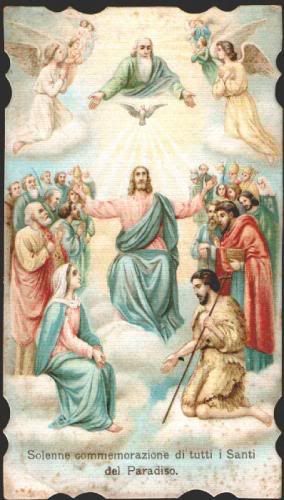
From The Liturgical Year, by Abbot Prosper Gueranger, OSB:
ON the day of Pentecost the holy apostles received, as we have seen, the grace of the Holy Ghost. In accordance with the injunction of their divine Master,1 they will soon start on their mission of teaching all nations, and baptizing men in the name of the holy Trinity. It was but right, then, that the solemnity which is intended to honour the mystery of one God in three Persons should immediately follow that of Pentecost, with which it has a mysterious connection. And yet, it was not until after many centuries that it was inserted in the cycle of the liturgical year, whose completion is the work of successive ages.
Every homage paid to God by the Church’s liturgy has the holy Trinity as its object. Time, as well as eternity, belongs to the Trinity. The Trinity is the scope of all religion. Every day, every hour, belongs to It. The feasts instituted in memory of the mysteries of our redemption centre in It. The feasts of the blessed Virgin and the saints are but so many means for leading us to the praise of the God who is One in essence, and Three in Persons. The Sunday’s Office, in a very special way, gives us, each week, a most explicit expression of adoration and worship of this mystery, which is the foundation of all others, and the source of all grace.
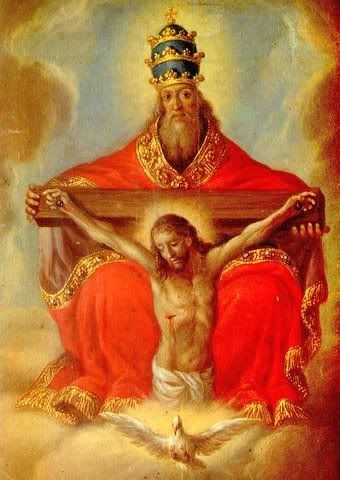
This explains to us how it is that the Church was so long in instituting a special feast in honour of the holy Trinity. The ordinary motive for the institution of feasts did not exist in this instance. A feast is the memorial of some fact which took place at a certain time, and of which it is well to perpetuate the remembrance and the influence. How could this be applied to the mystery of the Trinity? From all eternity, before any created being existed, God liveth and reigneth, Father, Son, and Holy Ghost. If a feast in honour of that mystery were to be instituted, it could only be by fixing some one day in the year, whereon the faithful would assemble for offering a more than usually solemn tribute of worship to the mystery of Unity and Trinity in the one same divine Nature.
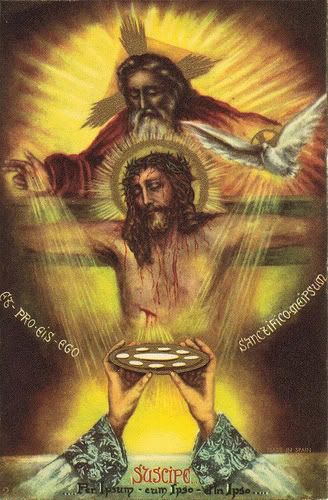
The idea of such a feast was first conceived by some of those pious and recollected souls, who are favoured from on high with a sort of presentiment of the things which the Holy Ghost will achieve, at a future period, in the Church. So far back as the eighth century, the learned monk Alcuin had had the happy thought of composing a Mass in honour of the mystery of the blessed Trinity. It would seem that he was prompted to this by the apostle of Germany, Saint Boniface. That this composition is a beautiful one, no one will doubt that knows, from Alcuin’s writings, how full its author was of the spirit of sacred liturgy; but, after all, it was only a votive Mass, a mere help to private devotion, which no one ever thought would lead to the institution of a feast. This Mass, however, became a great favourite, and was gradually circulated through the several Churches; for instance, it was approved of for Germany by the Council of Selingenstadt, held in 1022.
In the previous century, however, a feast properly so called of holy Trinity had been introduced into one of the Churches of Belgium--the very same that was to have the honour, later on, of procuring to the Church’s calendar one of the richest of its solemnities.
Stephen, bishop of Liege, solemnly instituted the feast of holy Trinity for his Church, in 920, and had an entire Office composed in honour of the mystery. The Church’s law, which now reserves to the holy See the institution of any new feast, was not then in existence; and Riquier, Stephen’s successor in the See of Liege, kept up what his predecessor had begun.
The feast was gradually adopted. The Benedictine Order took it up from the very first. We find, for instance, in the early part of the eleventh century, that Berne, the abbot of Reichna, was doing all he could to propagate it. At Cluny, also, the feast was established at the commencement of the same century, as we learn from the Ordinarium of that celebrated monastery, drawn up in 1091, in which we find mention of holy Trinity day as having been instituted long before.
Under the pontificate of Alexander II, who reigned from 1061 to 1073, the Church of Rome, which has frequently sanctioned the usages of particular Churches by herself adopting them, was led to pass judgment upon this new institution. In one of his decretals, the Pontiff mentions that the feast was then kept in many places; but that the Church at Rome had not adopted it, and for this reason: that the adorable Trinity is, every day of the year, unceasingly invoked by the repetition of the words: Gloria Patri et Filio et Spiritui sancto; as likewise by several formulas expressive of praise.
Meanwhile, the feast went on gaining ground, as we gather from the Micrologus; and, in the early part of the twelfth century, we have the learned abbot Rupert, who may justly be styled a doctor in liturgical science, explaining the appropriateness of that feast’s institution in these words: ‘Having celebrated the solemnity of the coming of the Holy Ghost, we, at once, on the Sunday next following, sing the glory of the holy Trinity; and rightly is this arrangement ordained, for, after the coming of the same holy Spirit, the faith in, and confession of, the name of Father, Son, and Holy Ghost, immediately began to be preached, and believed, and celebrated in Baptism.’
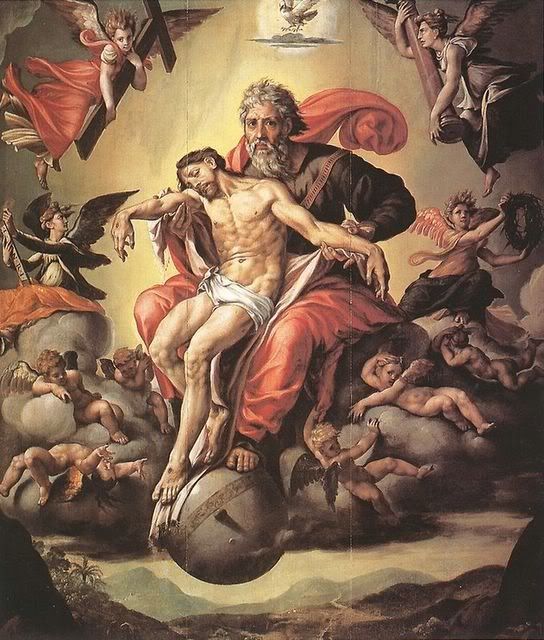
In our own country, it was the glorious martyr, St. Thomas of Canterbury, that established the feast of holy Trinity. He introduced it into his archdiocese, in the year 1162, in memory of his having been consecrated bishop on the first Sunday after Pentecost. As regards France, we find a Council of Arles, held in 1260 under the presidency of archbishop Florentinus, solemnly decreeing, in its sixth canon, the feast of holy Trinity to be observed with an octave. The Cistercian Order, which was spread throughout Europe, had ordered it to be celebrated in all its houses, as far back as the year 1230. Durandus, in his Rationale, gives us grounds for concluding that, during the thirteenth century, the majority of the Latin Churches kept this feast. Of these Churches, there were some that celebrated it, not on the first, but on the last, Sunday after Pentecost; others kept it twice: once on the Sunday next following the Pentecost solemnity, and a second time on the Sunday immediately preceding Advent.
It was evident, from all this, that the apostolic See would finally give its sanction to a practice, whose universal adoption was being prompted by Christian instinct. John XXII, who sat in the Chair of Saint Peter as early as the year 1334, completed the work by a decree, wherein the Church of Rome accepted the feast of holy Trinity, and extended its observance to all Churches.
As to the motive which induced the Church, led as she is in all things by the Holy Ghost, to fix one special day in the year for the offering of a solemn homage to the blessed Trinity, whereas all our adorations, all our acts of thanksgiving, all our petitions, are ever being presented to It: such motive is to be found in the change which was being introduced, at that period, into the liturgical calendar. Up to about the year 1000, the feasts of saints marked on the general calendar, and universally kept, were very few. From that time, they began to be more numerous; and there was evidence that their number would go on increasing. The time would come, when the Sunday’s Office, which is specially consecrated to the blessed Trinity, must make way for that of the saints, as often as one of their feasts occurred on a Sunday. As a sort of compensation for this celebration of the memory of God’s servants on the very day which was sacred to the holy Trinity, it was considered right that once, at least, in the course of the year, a Sunday should be set apart for the exclusive and direct expression of the worship which the Church pays to the great God, who has vouchsafed to reveal Himself to mankind in His ineffable Unity and in His eternal Trinity.
The very essence of the Christian faith consists in the knowledge and adoration of one God in three Persons. This is the mystery whence all others flow. Our faith centres in this as in the master-truth of all it knows in this life, and as the infinite object whose vision is to form our eternal happiness; and yet, we know it only because it has pleased God to reveal Himself thus to our lowly intelligence, which, after all, can never fathom the infinite perfections of that God, who necessarily inhabiteth light inaccessible.4 Human reason may, of itself, come to the knowledge of the existence of God as Creator of all beings; it may, by its own innate power, form to itself an idea of His perfections by the study of His works; but the knowledge of God’s intimate Being can come to us only by means of His own gracious revelation.
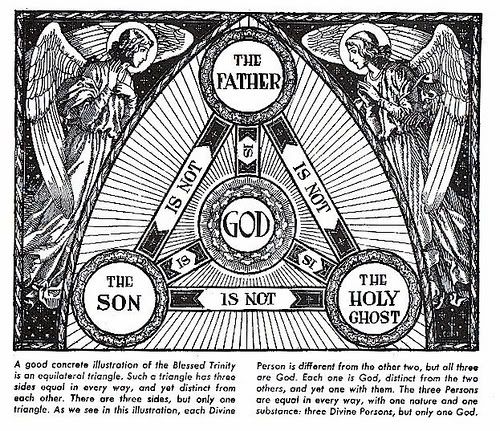
It was God’s good-pleasure to make known to us His essence, in order to bring us into closer union with Himself, and to prepare us, in some way, for that face-to-face vision of Himself which He intends to give us in eternity. But His revelation is gradual: He takes mankind from brightness unto brightness, fitting it for the full knowledge and adoration of Unity in Trinity, and Trinity in Unity. During the period preceding the Incarnation of the eternal Word, God seemed intent on inculcating the idea of His Unity, for polytheism was the infectious error of mankind; and every notion of there being a spiritual and sole cause of all things would have been effaced from the earth, had not the infinite goodness of God watched over its preservation.
Not that the old Testament Books were altogether silent on the three divine Persons, whose ineffable relations are eternal; only, the mysterious passages, which spoke of them, were not understood by the people at large; whereas, in the Christian Church, a child of seven will answer those who ask him, that, in God, the three divine Persons have but one and the same Nature, but one and the same Divinity. When the Book of Genesis tells us that God spoke in the plural, and said: ‘Let Us make man to Our image and likeness,’ the Jew bows down and believes, but he understands not the sacred text; the Christian, on the contrary, who has been enlightened by the complete revelation of God, sees, under this expression, the three Persons acting together in the formation of man; the light of faith develops the great truth to him, and tells him that, within himself, there is a likeness to the blessed Three in One. Power, understanding, and will, are three faculties within him, and yet he himself is but one being. In the Books of Proverbs, Wisdom, and Ecclesiasticus, Solomon speaks, in sublime language, of Him who is eternal Wisdom; he tells us--and he uses every variety of grandest expression to tell us—of the divine essence of this Wisdom, and of His being a distinct Person in the Godhead; but how few among the people of Israel could see through the veil! Isaias heard the voice of the Seraphim, as they stood around God’s throne; he heard them singing in alternate choirs, and with a joy intense because eternal, this hymn: ‘Holy! Holy! Holy! is the Lord!’ But who will explain to men this triple Sanctus, of which the echo is heard here below, when we mortals give praise to our Creator? So, again, in the Psalms, and the prophetic Books, a flash of light will break suddenly upon us; a brightness of some mysterious Three will dazzle us; but it passes away, and obscurity returns seemingly all the more palpable; we have but the sentiment of the divine Unity deeply impressed on our inmost soul, and we adore the Incomprehensible, the sovereign Being. The world had to wait for the fullness of time to be completed; and then, God would send into this world His only Son, begotten of Him from all eternity. This His most merciful purpose has been carried out, and the Word made Flesh hath dwelt among us. By seeing His glory, the glory of the only-begotten Son of the Father, we have come to know that, in God, there is Father and Son. The Son’s mission to our earth, by the very revelation it gave us of Himself, taught us that God is eternally Father, for whatsoever is in God is eternal. But for this merciful revelation, which is an anticipation of the light awaiting us in the next life, our knowledge of God would have been too imperfect. It was fitting that there should be some proportion between the light of faith, and that of the vision reserved for the future; it was not enough for man to know that God is One.
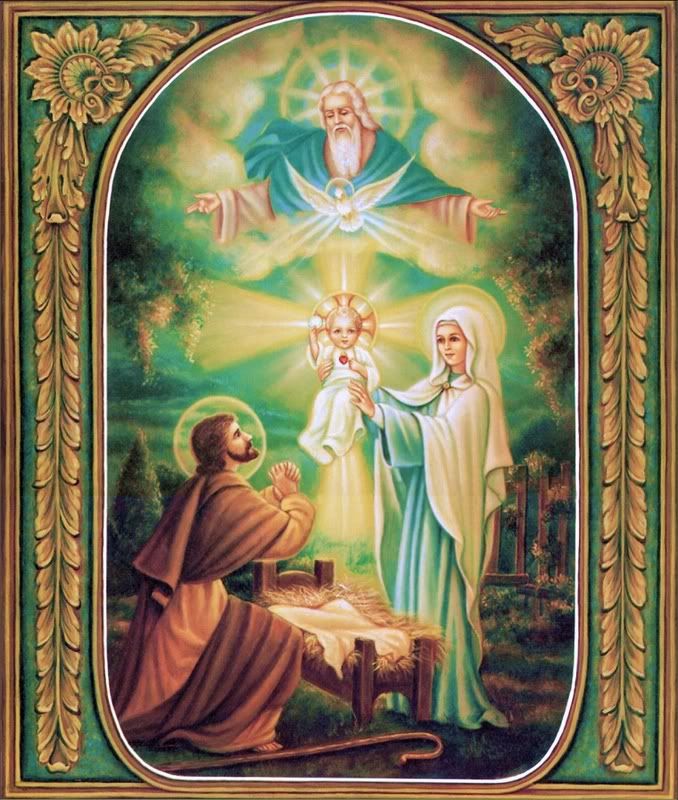
So that, we now know the Father, from whom comes, as the apostle tells us, all paternity, even on earth. We know Him not only as the creative power, which has produced every being outside Himself; but, guided as it is by faith, our soul’s eye respectfully penetrates into the very essence of the Godhead, and there beholds the Father begetting a Son like unto Himself. But, in order to teach us the mystery, that Son came down upon our earth. He Himself has told us expressly that no one knoweth the Father, but the Son, and he to whom it shall please the Son to reveal Him. Glory, then, be to the Son, who has vouchsafed to show us the Father! and glory to the Father, whom the Son hath revealed unto us!
The intimate knowledge of God has come to us by the Son, whom the Father, in His love, has given to us.11 And this Son of God, who, in order to raise up our minds even to His own divine Nature, has clad Himself, by His Incarnation, with our human nature, has taught us that He and His Father are one; that Theyare one and the same Essence, in distinction of Persons. One begets, the Other is begotten; the One is named Power; the Other, Wisdom, or Intelligence. The Power cannot be without the Intelligence, nor the Intelligence without the Power, in the sovereignly perfect Being: but, both the One and the Other produce a third Term.
The Son, who had been sent by the Father, had ascended into heaven, with the human Nature which He had united to Himself for all future eternity; and lo! the Father and the Son send into this world the Spirit who proceeds from Them both. It was a new Gift, and it taught man that the Lord God was in three Persons. The Spirit, the eternal link of the first two, is Will, He is Love, in the divine Essence. In God, then, is the fullness of Being, without beginning, without succession, without increase; for there is nothing which He has not. In these three eternal Terms of His uncreated Substance, is the Act, pure and infinite.
The sacred liturgy, whose object is the glorification of God and the commemoration of His works, follows, each year, the sublime phases of these manifestations, whereby the sovereign Lord has made known His whole self to mortals. Under the sombre colours of Advent, we commemorated the period of expectation, during which the radiant Trinity sent forth but few of Its rays to mankind. The world, during those four thousand years, was praying heaven for a Liberator, a Messiah; and God’s own Son was to be this Liberator, this Messiah. That we might have the full knowledge of the prophecies which foretold Him, it was necessary that He Himself should actually come: a Child was born unto us,13 and then we had the key to the Scriptures. When we adored that Son, we adored also the Father, who sent Him to us in the Flesh, and with whom He is consubstantial. This Word of life, whom we have seen, whom we have heard, whom our hands have handled in the Humanity which He deigned to assume, has proved Himself to be truly a Person, a Person distinct from the Father, for One sends, and the Other is sent. In this second divine Person, we have found our Mediator, who has reunited the creation to its Creator; we have found the Redeemer of our sins, the Light of our souls, the Spouse we had so long desired.
Having passed through the mysteries which He Himself wrought, we next celebrated the descent of the holy Spirit, who had been announced as coming to perfect the work of the Son of God. We adored Him, and acknowledged Him to be distinct from the Father and the Son, who had sent Him to us with the mission of abiding with us. He manifested Himself by divine operations which are peculiarly His own, and were the object of His coming. He is the soul of the Church; He keeps her in the truth taught her by the Son. He is the source, the principle of the sanctification of our souls; and in them He wishes to make His dwelling. In a word, the mystery of the Trinity has become to us, not only a dogma made known to our mind by revelation, but, moreover, a practical truth given to us by the unheard-of munificence of the three divine Persons: the Father, who has adopted us; the Son, whose brethren and joint-heirs we are; and the Holy Ghost, who governs us, and dwells within us.
Let us, then, begin this day, by giving glory to the one God in three Persons. For this end, we will unite with holy Church, who in her Office of Prime recites on this solemnity, as also on every Sunday not taken up by a feast, the magnificent Symbol known as the Athanasian Creed. It gives us, in a summary of much majesty and precision, the doctrine of the holy Doctor St. Athanasius, regarding the mysteries of the Trinity and the Incarnation.
Athanasian Creed
Whosoever will be saved, before all things it is necessary that he hold the Catholic faith.
Which faith except everyone do keep whole and undefiled, without doubt he shall perish everlastingly.
And the Catholic faith is this, that we worship one God in Trinity and Trinity in Unity,
Neither confounding the Persons nor dividing the Substance.
For there is one Person of the Father, another of the Son, and another of the Holy Ghost.
But the Godhead of the Father, of the Son, and of the Holy Ghost is one: the glory equal, the majesty coeternal.
Such as the Father is, such is the Son, and such is the Holy Ghost.
The Father uncreated, the Son uncreated and the Holy Ghost uncreated
The Father incomprehensible, the Son incomprehensible, and the Holy Ghost incomprehensible.
The Father eternal, the Son eternal, and the Holy Ghost eternal.
And yet they are not three Eternals, but one Eternal.
As there are not three Uncreated nor three Incomprehensibles, but one Uncreated and one Incomprehensible.
So likewise the Father is almighty, the Son almighty, and the Holy Ghost almighty.
And yet they are not three Almighties, but one Almighty.
So the Father is God, the Son is God, and the Holy Ghost is God.
And yet they are not three Gods, but one God.
So likewise the Father is Lord, the Son Lord, and the Holy Ghost Lord.
And yet not three Lords, but one Lord.
For like as we are compelled by the Christian verity to acknowledge every Person by Himself to be God and Lord,
So are we forbidden by the Catholic religion to say, There be three Gods or three Lords.
The Father is made of none, neither created nor begotten.
The Son is of the Father alone, not made nor created, but begotten.
The Holy Ghost is of the Father and of the Son, neither made nor created nor begotten, but proceeding.
So there is one Father, not three Fathers; one Son, not three Sons; one Holy Ghost, not three Holy Ghosts.
And in this Trinity none is before or after other; none is greater or less than another;
But the whole three Persons are coeternal together and coequal, so that in all things, as is aforesaid, the Unity in Trinity and the Trinity in Unity is to be worshiped.
He, therefore, that will be saved must thus think of the Trinity.
Furthermore, it is necessary to everlasting salvation that he also believe faithfully the incarnation of our Lord Jesus Christ.
For the right faith is that we believe and confess that our Lord Jesus Christ, the Son of God, is God and Man;
God of the Substance of the Father, begotten before the worlds; and Man of the substance of His mother, born in the world;
Perfect God and perfect Man, of a reasonable soul and human flesh subsisting,
Equal to the Father as touching His Godhead and inferior to the Father as touching His manhood;
Who, although He be God and Man, yet He is not two, but one Christ:
One, not by conversion of the Godhead into flesh, but by taking the manhood into God;
One altogether; not by confusion of Substance, but by unity of Person.
For as the reasonable soul and flesh is one man, so God and Man is one Christ;
Who suffered for our salvation; descended into hell; rose again the third day from the dead;
He ascended into heaven; He sitteth on the right hand of the Father, God Almighty; from whence He shall come to judge the quick and the dead.
At whose coming all men shall rise again with their bodies and shall give an account of their own works.
And they that have done good shall go into life everlasting; and they that have done evil, into everlasting fire.
This is the Catholic faith; which except a man believe faithfully and firmly, he cannot be saved.
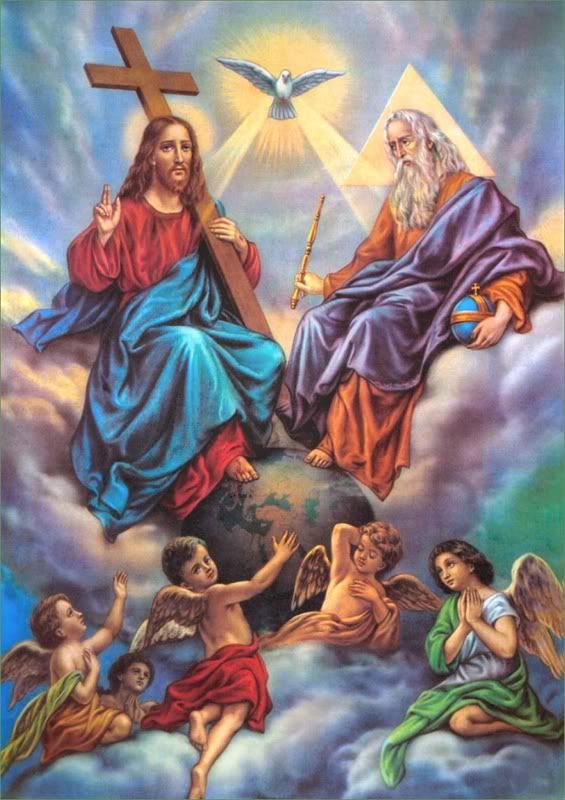
Labels: Restorationists
Daily Marian Prayer And Image During the Month Of May
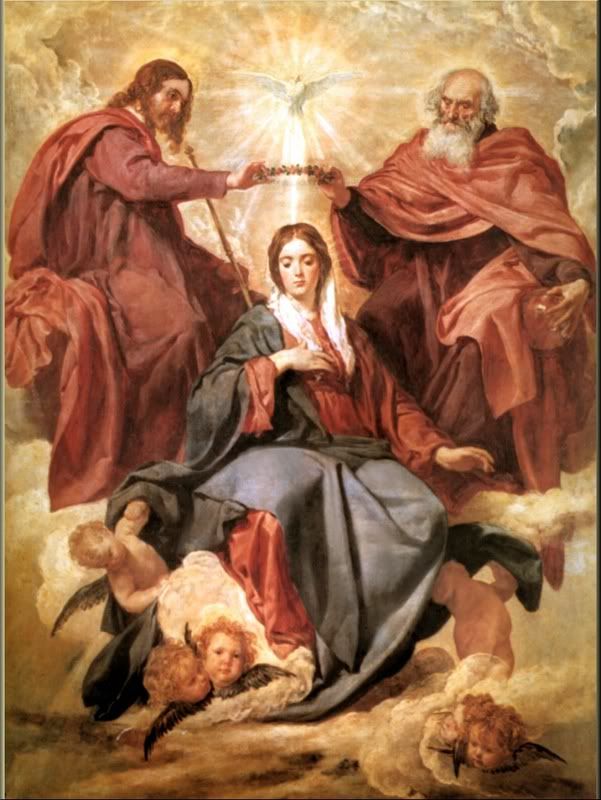
From The Glories Of Mary, by Saint Alphonsus Liguori:
O Mary, my most dear Mother, in what an abyss of evils should I not now be, if thou hadst not so many times delivered me with thy compassionate hand! How many years ago should I not have been in hell, hadst thou not saved me by thy powerful prayers! My grievous sins already drove me there; divine justice had already condemned me; the devils already longed to execute the sentence; and thou didst fly to my aid, and save me without being even called or asked. And what return can I make to thee, O my beloved protectress, for so many favors and for such love?
Thou also didst overcome the hardness of my heart, and didst draw me to thy love and to confidence in thee. And into how many other evils should I not have fallen, if with thy compassionate hand thou hadst not so often helped me in the dangers into which I was on the point of falling! Continue, O my hope, to preserve me from bell, and from the sins into which I may still fall. Never allow me to have this misfortune—to curse thee in hell.
My beloved Lady, I love thee. Can thy goodness ever endure to see a servant of thine that loves thee lost? Then, obtain that I may never more be ungrateful to thee and to my God, who for the love of thee has granted me so many graces.
O Mary, tell me, shall I be lost? Yes, if I abandone thee. But is this possible? Can I ever forget the love thou has borne me? Thou, after God, art the love of my soul. I can no longer trust myself to live without loving thee.
O most beautiful, most holy, most amiable, sweetest creature in the world, I rejoice in thy happiness. I love thee, and I hope always to love thee both in time and in eternity.
Amen.
Labels: Restorationists






































































































